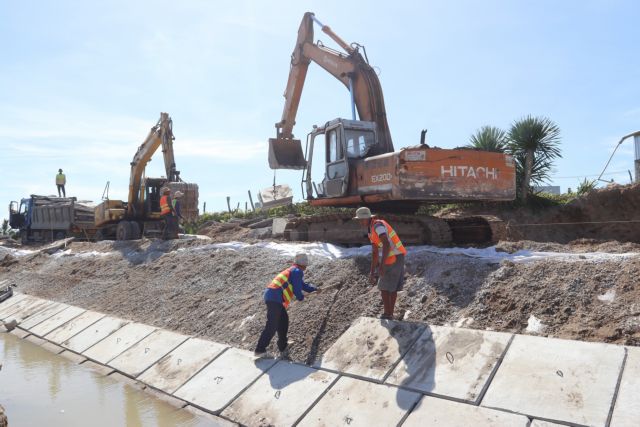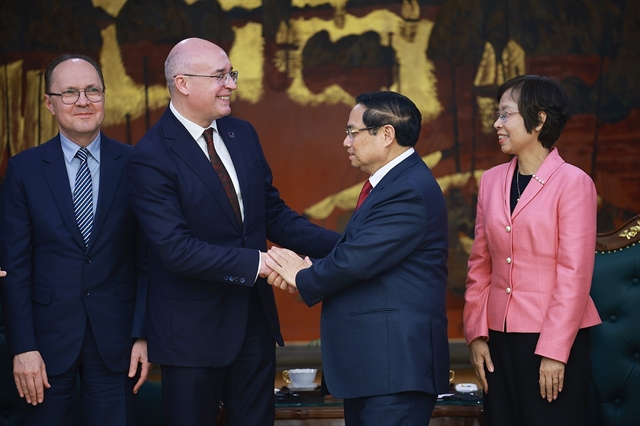 Politics & Law
Politics & Law

 |
| Construction work on an embankment is conducted in Khánh Hoà Province. The newly-founded working groups will manage infrastructure construction, promote growth and accelerate disbursement of public investment capital. — VNA/VNS Photo Nguyễn Thành |
HÀ NỘI — Prime Minister Phạm Minh Chính has established eight working groups to remove difficulties related to production, business, infrastructure construction, and imports and exports, as well as promote growth and accelerate disbursement of public investment capital.
The PM’s Decision 1544/QD-TTg, issued on Wednesday, clearly states that the eight working groups headed by Government leaders aim to achieve and exceed the economic growth target of over eight per cent this year and double digits in the following years.
Working Group 1, led by PM Chính, monitors Hà Nội, HCM City and Cần Thơ.
Deputy PM Nguyễn Hoà Bình will lead Working Group 2, which is in charge of the National Assembly Office, the Government Office, the Supreme People's Court, the Supreme People's Procuracy, the Ministry of National Defence, the Ministry of Public Security, the Ministry of Home Affairs, the Government Inspectorate and the Việt Nam Cooperative Alliance, as well as localities including Huế, Đà Nẵng, Quảng Ngãi, Gia Lai and Bắc Ninh.
Working Group 3 is managed by Deputy PM Trần Hồng Hà. It will monitor the Ministry of Agriculture and Environment, the Ministry of Construction, the Party Central Committee Office, the President Office, the Việt Nam Fatherland Front Central Committee, Việt Nam National Univesity - Hà Nội and Việt Nam National University - HCM City as well as An Giang, Cà Mau, Đồng Tháp and Vĩnh Long provinces.
Led by Deputy PM Lê Thành Long, Working Group 4 is responsible for the Ministry of Justice, the Ministry of Education and Training, the Ministry of Health, the National Committee of the Việt Nam Union of Literature and Arts Associations, the Việt Nam Journalists Association, the Việt Nam Writers Association and the Việt Nam Lawyers Association along with Đắk Lắk, Khánh Hoà and Lâm Đồng provinces.
Working Group 5, headed by Deputy PM Hồ Đức Phớc, will oversee the Ministry of Finance, the State Bank of Việt Nam, the Việt Nam Development Bank, the Việt Nam Bank for Social Policies, the State Audit and localities including Đồng Nai, Hưng Yên, Quảng Ninh and Hải Phòng.
Managed by Deputy PM Bùi Thanh Sơn, Working Group 6 is keeping a close watch on the Ministry of Foreign Affairs, the Ministry of Industry and Trade, and Vietnam Electricity along with Tuyên Quang, Cao Bằng, Lạng Sơn, Thái Nguyên and Phú Thọ.
Working Group 7 is guided by Deputy PM Nguyễn Chí Dũng, and manages the Ministry of Science and Technology, the Việt Nam Academy of Science and Technology, the Việt Nam Academy of Social Sciences, the Việt Nam Union of Science and Technology Associations as well as Ninh Bình, Thanh Hoá, Nghệ An, Hà Tĩnh and Quảng Trị provinces.
Deputy PM Mai Văn Chính will lead Working Group 8, which is in charge of the Ministry of Culture, Sports and Tourism, the Ministry of Ethnic Minorities and Religions, the Hồ Chí Minh National Academy of Politics, the Vietnam News Agency, the Voice of Việt Nam, Việt Nam Television and Tây Ninh, Điện Biên, Lai Châu, Sơn La and Lào Cai provinces.
The deputy heads of the working groups are the leaders of the Ministry of Finance.
The groups’ members include the heads of the ministries of construction, agriculture and environment, industry and trade, justice, the Government Office and a number of related agencies.
The Ministry of Finance is the standing body of the working groups and is responsible for assisting the groups’ leaders in preparing their reports on working results, proposals and recommendations to send to the Government in regular Government meetings.
Based on monthly disbursement data, the groups will publicly disclose the list of ministries, central and local agencies with disbursement rates below the national average, which will require inspections.
The list will be published on the National Information System on Public Investment and on the Ministry of Finance's portal.
The groups will instruct ministries, central and local agencies to submit written reports on the disbursement situation at the end of each month, which will be sent to the Ministry of Finance as well as the Government Office.
Duties and powers
The PM's decision also regulates the Working Groups’ tasks, specifically reviewing and analysing any causes of difficulties and proposing solutions.
The work will be reported to the Government before the 25th of each month.
The working groups will review responsibilities in leadership, direction, supervision, inspection and handling of difficulties at ministries, agencies and localities, including responsibilities of the heads.
Each working group has the right to ask ministries and central and local agencies to provide information and assign staff to coordinate with them in performing these tasks.
The Working Group leaders will assign tasks to the groups’ members and develop a working plan that clearly identifies obstacles and the authority to resolve issues.
On that basis, they will direct resolutions according to their authority and legal regulations, and at the same time summarise their work to report to relevant authorities.
The PM’s decision comes into force from the date of signing and promulgation. — VNS




